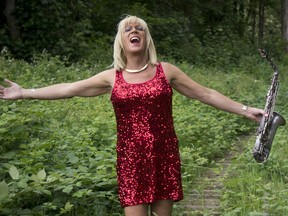Vancouver-based artist, author and activist Nikita Carter has released a new memoir.

Reviews and recommendations are unbiased and products are independently selected. Postmedia may earn an affiliate commission from purchases made through links on this page.
Article content

Both Sides of the Great Divide
Nikita Carter | transgenderpublishing.ca
$26.26 | 130 pages
Many different things make a person discover their real identity. The events that led Coat Cooke, the B.C.-based and globally lauded jazz saxophonist, composer, bandleader and tireless champion of avant-garde art, to become Nikita Carter at age 63 are profound.
In her new treatise titled Both Sides of the Great Divide, the artist/author dubbed “thee Nikita” recounts the journey to transitioning into her true self after living on “both sides of the great divide, of being a privileged, white male and an outcast, trans woman with basically no societal status.”
Advertisement 2
Article content
Drawing from journal entries, therapy sessions and the innate expressive rawness of improvised art, Carter takes readers through the process of being “broken open” and explores the “healing process.”
At a juncture in history when gender roles are being thrust into the culture wars with little or no concern for the actual human beings caught up in the cacophony, Carter introduces another facet of the experience.
That of being an individual who makes this life-changing decision after a fully lived experience as a different-but-similar person and what the lived reality of that can be.
Carter talked about penning her book and the goal behind it:
Q: What led you to write your book?
A: Ten years ago, before I emerged/came out, trans support was nowhere near where it is now. I couldn’t find a therapist who could talk to a 63-year-old about this because everything was focused around people going through this in their 20s or 30s. So I started writing things down as a way to process the experiences. I wrote a lot for about three years before I wondered if I might have something that could be helpful to people old or young in that situation.
Article content
Advertisement 3
Article content
Q: You didn’t write this as a memoir but more as a means of illuminating the experiences and emotions that come with making such a decision, why?
A: What is it that compels profound change became the lens I chose to approach the material from, because that applies to anybody. It’s kind of an empathy window to allow someone to understand what are those turning points that led to what I’ve chosen to describe as “breaking open.” We all go through such things.
Q: What were your turning points?
A: There were five traumas in less than two years. My oldest friend died suddenly, then my mother died, then I was in a very serious head-on car accident, my partner left me while I was still in recovery. Plus, all of that led to having to leave my position as artistic director of the arts organization I founded after 20 years. During therapy sessions, it became clear that Nikita had been there waiting to emerge for a long time.
Q: You write about relying on the tools you had at your disposal to aid in your transition and improvising features heavily, can you unbox that?
A: As I was looking at what the tools were I had at my disposal and where they came from, one of the main ones that emerged was all of the years as an improviser. An improviser is ready to take on anything and be available at the moment and it’s a pretty powerful skill. A part of the book looks at why a white kid from Winnipeg spent 50 years in the avant-garde.
Q: The closing chapter of the book outlines a scary arrest in Mexico that spurred you to new art and activism. Being thee Nikita continues to draw upon your improvising skills for life doesn’t it?
A: That was an awful experience, but one that jump-started certain new conversations about what I want to do with the time I have left in life. There is so much work to do in advocacy and education around trans issues and the different realities around them depending on your age. I’m not telling anyone what to do, because that is intensely personal, but my way of surviving through this was to ask questions that can build community and understanding as well as continuing to explore the playful side with my trio and other projects.
Advertisement 4
Article content
Recommended from Editorial
Bookmark our website and support our journalism: Don’t miss the news you need to know — add VancouverSun.com and TheProvince.com to your bookmarks and sign up for our newsletters here.
You can also support our journalism by becoming a digital subscriber: For just $14 a month, you can get unlimited access to The Vancouver Sun, The Province, National Post and 13 other Canadian news sites. Support us by subscribing today: The Vancouver Sun | The Province.
Article content




Comments